![]() — Russkiy Mir Foundation — Journal — Articles — Gogol Was Once So Young…
— Russkiy Mir Foundation — Journal — Articles — Gogol Was Once So Young…
 Gogol Was Once So Young…
Gogol Was Once So Young…
Some books have always been with us – eternal as the sun, grass or New Year’s tree. Therefore it’s now rather difficult to grasp that one day they also broke their way into world literature like comets, overwhelming and gladdening us with their power. This is as difficult as imaging our granny being a young lady and mom being a little girl. That is exactly the case with Evenings on a Farm near Dikanka.

Slightly more than 180 years ago critic Pyotr Pletnev told Pushkin about young and “very promising” writer Gogol-Yanovsky. He said: “I cannot wait to bring him to you for a blessing.” In those days Gogol was only a promising young author: the titles of his early works (perhaps with the exception of the unsuccessful Hans Kuechelgarten) – A Chapter from a Historical Novel, The Teacher or Woman – say very little to the modern-day reader.
Nikolai was then teaching at the Patriotic Institute where he was employed at Pletnev’s recommendation, and he also gave private lessons and was a teacher of mentally retarded Vasya, the son of Alexandra Vasilchikova who was the aunt of writer Vladimir Sollogub. Sollogub thus describes his first acquaintance with Gogol: “We entered the nursery where a mentor was sitting with his pupil at a writing table and, pointing to the images of different animals, he was imitating the sounds they produce – bleating, lowing, grunting, etc. The teacher seemed to enjoy imitating the animal sounds.”
Gogol began working on his Evenings as early as in 1829 when he barely turned 20. In his letters home he was pleading with his mother to tell him about “the Ukrainian customs, traditions, tales and folk wisdom at the grassroots level,” to describe the attire of a rural deacon, a wedding rite, exciting jokes… It took him three years to complete on the novel, which was finished in 1832; the author was also distracted by the historical novel Hetman and a trip abroad. The same old friend Pyotr Pletnev recommended that Gogol should hide under the penname of “Beekeeper Rudy Panko.”
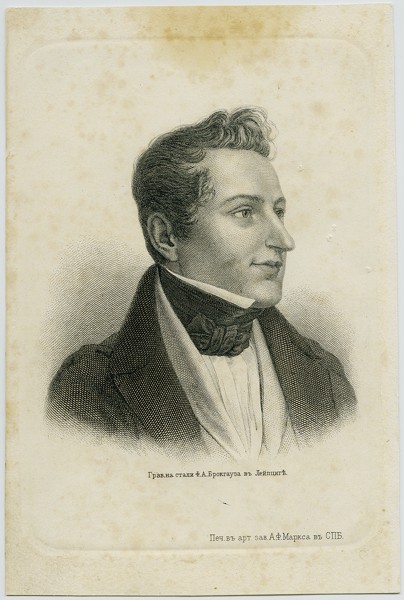
Sollogub recollected that in the evenings the young teacher would read to Vasilchikova, her old mother and a host of dependents his May Night. “Whoever has not heard Gogol reading is not well familiar with his works. He imparted special coloring to them with his calmness, his special accent, illusive shades of archness and humor that reverberated in his voice and were reflected on his sharp-nosed face, while his small gray eyes were kindly smiling and he shook up his hair always falling down on his forehead. Depicting the Ukrainian night, he seemed to be pouring into the reader’s mind the impressions of summer freshness, the dark blue height strewn with stars and full of fragrance and inner freedom.
Suddenly he stopped reading. “This is not the right way to dance the gopak!” The dependents exclaimed: “Why not?” They thought Gogol’s remark was meant for them. Gogol smiled and continued the drunken peasant’s narrative. I must frankly confess that I was overwhelmed and utterly defeated; I wanted to take him into my arms and carry him outside, where he belonged.”
Very soon the first part of Evenings on a Farm near Dikanka saw light; it included four stories – The Fair at Sorochintsi, St John’s Eve, May Night and The Lost Letter. Ten years later Gogol, collecting his early works, wondered whether he’d better scrap them altogether and yet he did not: “Those were my first writing experiences, unworthy of the sophisticated reader; but they were full of the first sweet instances of immature inspiration and it would be a pity to discard them, even as it would be a pity to expunge from my memory the first games of irretrievable adolescence.” Indeed Gogol, the author of the phrase “Do you know anything about the Ukrainian night?” was in his early twenties – a rare phenomenon of an absolutely mature, lucid and pure teenage genius, rare even for Russian literature, which is pampered with abundant extraordinary talent.
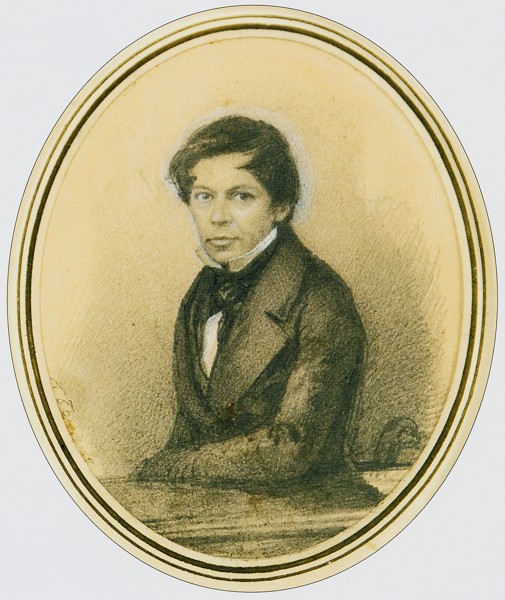
Now it’s hard to imagine the overwhelming impression produced by the lively, poetic and beautiful Evenings on the Russian audience. In those years national literature was still just barely emerging, its golden stock was limited and actively replenished by living writers. Created mainly by gentry and nobles, it savored of saloons and pretentious libraries, only occasionally making its way to the lap of romantic nature… The village as it is, with all its inhabitants, would maybe emerge somewhere on the fringe, half way between resplendent St. Petersburg and Moscow.
And now all of a sudden the entire motley, noisy, hilarious, fearful and touching rural universe with its poetry and traditions burst into the dignified literary environment. Gogol wrote in his letter to Pushkin (Pletnev introduced them to each other in May 1831) that he had given the giggles to type setters: “My first experience with the printing works was most curious. No sooner had I popped my head in at the door, than the type setters started tittering and chuckling. I was somewhat perplexed. I inquired my agent closely and, after several adroit evasions, he finally confessed: “The pieces you sent from Pavlovsk for printing seemed extremely amusing to the type setters. I concluded from his words that my writings appealed to the mob.”
Pushkin replied: “Congratulations on your first triumph, the tittering of the type setters, and the explanations of your agent. I am also looking forward to the response of the journalist community and the sharp-witted inmate.” By “the sharp-witted inmate” he meant Nikolai Polevoy, the publisher of The Moscow Telegraph.
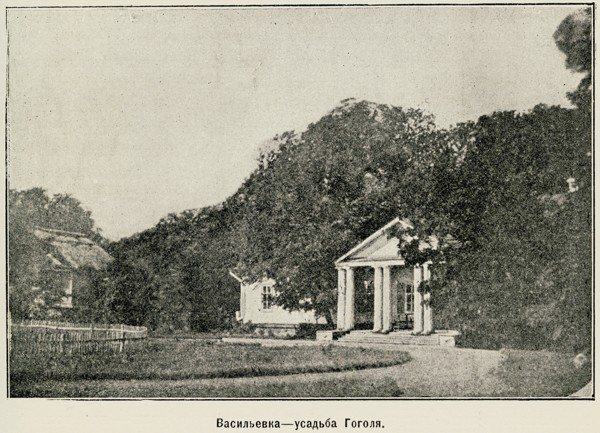
Savvy and lettered Pushkin, like the simple-minded type setters, had long been fascinated by the new book. He described his impressions in his letter to Voyeikov, the publisher of Literary Annex to the Russian Invalid: “Here is the genuine, sincere, hang-loose exhilaration without any affectation or ceremoniousness, and what poetry here and there, what sentimentality! This is all so uncommon in today’s literature that I still have not come to my senses.” And he reminded in his review in 1836: “Our readers certainly remember the impression produced upon them by Evenings on a Farm: everybody rejoiced at this lively description of a singing and dancing tribe, at these fresh pictures of Ukrainian nature, at this ingenuous and yet roguish hilarity. We marveled at the Russian book that made us laugh; we have not laughed so sincerely since the days of Fonvizin!” Meanwhile forty full years had lapsed since the days of Fonvizin and nothing similar to his Nedorosl (“Young Oaf”) had come off the press until the glory of the latter was overshadowed by Gogol with his Marriage and The Government Inspector.
True, Pushkin also noticed in the Evenings “the abruptness and irregular turn of phrase, the incoherence in some stories that are larger-than-life”; but who will now dare to criticize the book, hewn as it were out of a marble block, for stylistic imperfections? But 180 years ago it had just come off the press while critics did their work, finding faults and wrangling. Pushkin, foreseeing a storm of criticism to be poured on the young author, asked the publisher of the Annex to The Russian Invalid: “For God’s sake, side with him if journalists, according to their custom, attack the indecency of his phrases, bad form, etc.”
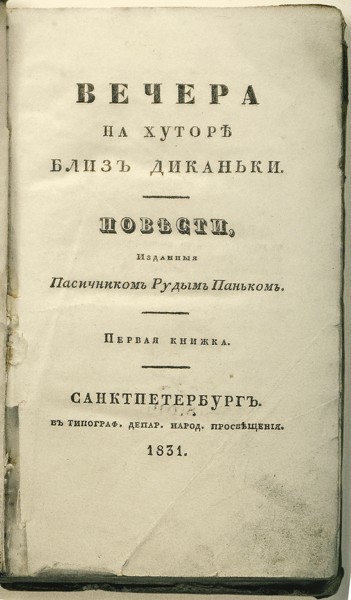
There were certainly enough of those willing to attack the young writer, the first being that very “sharp-witted inmate” Nikolai Polevoy who had his article about Ukraine, its inhabitants and history published in The Moscow Telegraph a short time ago. Gogol’s friend Orest Somov had a case against that article on the pages of Literary Newspaper and Polevoy suspected that it was Somov who was hiding behind the penname “Beekeeper Rudy Panko.” Somehow or other, he ruthlessly scolded the book in The Moscow Telegraph, addressing the author himself: “We just cannot grasp with our Russian minds this grandiloquence, you know;” “the desire to cater to the Ukrainian spirit confounded your language and your turn of phrase to such an extent that here and there the meaning is totally obscured.”… Polevoy even imputed “poor imagination” and “scanty inventiveness” on Gogol, let alone his blaming for “deviation from the rule of taste, laws of the beautiful” and even “spelling mistakes”, which Pushkin expected.
Writer Andrei Storozhenko, writing under the penname Andry Tsarynny, published in the four consecutive issues of The Son of Fatherhood and Northern Archive his ethnographic expert examination of the Evenings. He pointed out in a pernickety way that Levko could not play the pandura (mandolin-like Ukrainian musical instrument), because only blind men played it, that hetman’s messenger in The Lost Letter could not travel via Konotop, while the song sung by lads under the windows of the village chief represented “a confusion of the Ukrainian dialect with the Russian language”, and so on. He admitted that the book was very amusing and picturesque, though. Disputes over the ethnographic accuracy of the Evenings dragged on for several decades. Polemists kept finding new inaccuracies in Gogol’s narrative, although it was obvious to everyone that the book was just a phantasmagoria that never claimed an ethnographically veritable description of the Ukrainian everyday life.
Orest Somov in the same Literary Annex to the Russian Invalid and Nikolai Nadezhdin in The Telescope quickly raised their objections. By the publication of the Evenings, part 2, the prevailing public opinion about this book – probably thanks to Pushkin’s good graces – was that this was a lively, hilarious and sharp-witted work, notwithstanding the deep sorrow permeating even the light and lucid May Night, to say nothing about the extravaganza and diablerie so profuse in this anecdotal and exhilarating book. The second book that saw the light in March 1832 included four more stories: Christmas Eve, The Fearful Vengeance, praised nearly by all critics as the strongest work in the series, Ivan Fyodorovich Shponka and His Aunty that was overlooked by critique and A Bewitched Place.
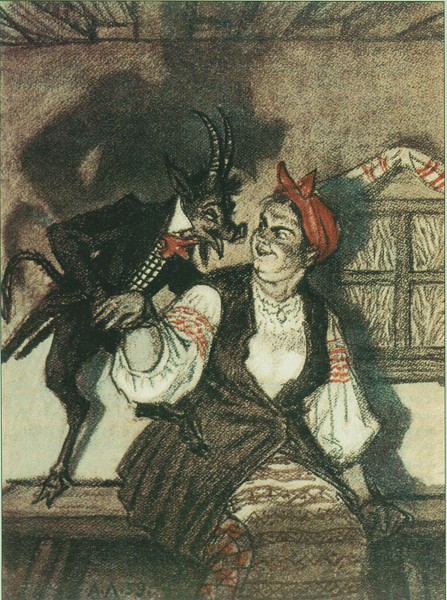
Baratynsky, to whom Gogol presented his book, said this: “We’ve never had another author with such jovial mirth which is quite rare on our northern latitudes. Yanovsky is a man of brilliant talent. His turn of phrase is lively, offbeat, and resplendent with color and taste. On many occasions he is a sharp-sighted onlooker and in his Fearful Vengeance he is also an awesome poet.” The Telescope noted that “Rudy Panko is like an artist that has mastered a bold, gorgeous and powerful brush. His pictures are bubbling with life” while Polevoy had to admit in The Moscow Telegraph that the second book was very good, though he once again discerned “significant linguistic irregularities.” And, like many other critics, he also found “inexhaustible joviality” in Gogol’s writings.
But while Christmas Eve was indeed killingly funny, The Fearful Vengeance is not exhilarating at all! No wonder that many saw a lot of poetry in pani Katerina with her languid, restless and groaning soul, but how could they not discern a different Gogol with his fear of death, metaphysical insights, and acute melancholy? Why did they not take any note of Shponka, whence the third Mirgorod’s and Government Inspector’s Gogol began with his sharp eye and tart temper?
Nevertheless, Evenings on a Farm near Dikanka was indeed the “adolescence” of Russian literature, with its best features including forcefulness, emotional sincerity, ingenuousness, spontaneity and beauty. These were discerned by Belinsky who thus commented on the Evenings in 1835: “These were poetic essays about Ukraine, full of life, vigor and fascination. All natural beauties, everything attractive in the rural living of peasants, every original and typical feature of their everyday life are iridescent in these early poetic daydreaming of Gogol. This was youthful, fresh and fragrant poetry.”
Young Gogol did not set any special objectives as he was writing his Evenings. He did not teach or preach anything, did not purport to rebuke or improve the morals – he was just writing for the joy of it like a bird that sings just because it cannot be silent. It was later that he would castigate evil, chastising it with scorpions, and receive his share of glory, denouncement and mockery… And Evenings on a Farm near Dikanka will forever remain a monument to happy adolescence, full of vigor and love, which has a whole life ahead of it, living, singing and rejoicing because this was simply its natural course.
Author: Anna Gamalova




